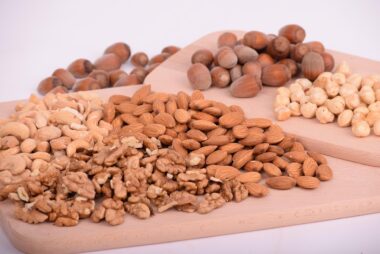The Importance of Micronutrients in Pre-Workout Nutrition
Pre-workout nutrition plays a crucial role in maximizing performance and recovery, needing adequate intake of macronutrients and micronutrients. Vitamins and minerals are often overlooked but are essential for energy production and muscle function during workouts. Micronutrients aid in the metabolic pathways that generate energy from carbs, fats, and proteins. Key minerals such as magnesium and calcium assist with muscle contractions, preventing cramps and enhancing endurance. Vitamins, especially B-complex vitamins, are vital for energy conversion and overall performance. Antioxidants like vitamin C and E help combat oxidative stress generated during intense physical activity, supporting quicker recovery post-exercise. Incorporating a balanced diet rich in colorful fruits and vegetables ensures an adequate supply of these essential nutrients. Food options like spinach, berries, and bananas provide a broad spectrum of vitamins necessary for optimal energy levels. Additionally, understanding the role of hydration cannot be underestimated; proper fluid intake facilitates nutrient transport and muscle efficiency. Therefore, pre-workout meals should focus on hydration, alongside a balanced micronutrient intake that primes the body for rigorous activity.
Micronutrients: Types and Their Benefits
Micronutrients can be divided into two categories: vitamins and minerals, each serving unique functions in the body. Vitamins are organic compounds vital for numerous physiological functions, including energy production, immune function, and muscle repair. Water-soluble vitamins, like B and C, must be regularly consumed since they are not stored in significant amounts. On the other hand, fat-soluble vitamins, such as A, D, E, and K, accumulate in fatty tissues. Minerals, which are inorganic elements, also play key roles. Calcium supports bone health and muscle function, while magnesium helps decompose ATP, the energy currency of the cell. Iron is another essential mineral crucial for oxygen transportation in the blood. Undeniably, maintaining an appropriate balance of these micronutrients directly influences muscle building and energy levels. Insufficient quantities can lead to diminished workout performance and sluggish recovery rates. Therefore, it is paramount to incorporate a diverse range of whole foods primarily, such as vegetables, nuts, seeds, and whole grains, into one’s pre-workout meals, allowing athletes and fitness enthusiasts to meet their micronutrient needs efficiently.
Incorporating micronutrients into your pre-workout routine can significantly enhance performance and muscle recovery. Before starting an intense workout, consuming foods that are rich in vitamins and minerals is crucial. This nutritional strategy helps to ensure sustained energy levels throughout your training session, minimizing fatigue. Consider opting for a blend of complex carbohydrates along with high-quality protein. Such foods assist with immediate energy needs, while the addition of micronutrient-rich options ensures optimal nutrient absorption. Also, integrating leafy greens, nuts, and colorful fruits or vegetables into pre-workout meals can yield both energy and essential nutrients for muscle support. Consuming a balanced meal 60 to 90 minutes before workouts is advisable, enabling digestion and assimilation. Timing matters, as the right pre-workout meal can influence the effectiveness of the subsequent workout. Besides energy inputs, the hydration aspect also demands attention. Staying hydrated ensures effective circulation and nutrient delivery, optimizing performance. Adding a pinch of sea salt may boost electrolyte intake, directly aiding performance and reducing cramping during workouts. Thus, effective planning around meal timing and balanced nutrition is key in paving the way for significant fitness outcomes.
The Best Micronutrients for Muscle Building
When it comes to muscle building, specific micronutrients stand out in importance. Vitamin D possesses a critical role in muscle function and strength, as it aids calcium absorption, essential for muscle contractions. Additionally, incorporating sufficient vitamin K is beneficial for bone health, supporting overall muscle performance. Zinc holds importance in promoting testosterone levels, thus enhancing muscle growth and repair processes. Furthermore, B vitamins, including B6 and B12, are important as they assist in energy metabolism, nerve function, and red blood cell formation. A deficiency in any of these vitamins can have a ripple effect on workout efficiency. Likewise, minerals like potassium and magnesium are key players in muscle function, being vital for nerve transmission and contraction efficiency. Consuming foods fortified with these vitamins and minerals, or even considering food-based supplements, can aid in reaching optimal nutrient levels. Targeting these nutrients provides a holistic approach to muscle building. Ensuring they are present in your pre-workout meals will maximize benefits, turning effort into achievement. Therefore, a supplement regime combined with a whole-food diet can significantly speed the muscle recovery process, increasing overall performance.
Beyond the basic nutrient categories, phytonutrients found in fruits and vegetables also contribute significantly to performance and recovery. Phytonutrients serve antioxidant functions and assist with reducing inflammation by improving the body’s response to workout-related stressors. Some fruits, such as berries, are particularly high in these beneficial compounds, which can aid in post-exercise recovery through enhanced circulation and reduced muscle soreness. Another excellent addition to pre-workout nutrition is beetroot juice, known for its high nitrate content, which can enhance blood flow and improve endurance performance. These elements in your diet can greatly influence how well your body responds to stress during workouts while optimizing recovery post-exercise. Including a variety of fruits enhances both flavor and nutrient variety in meals. Aim for a colorful plate that provides a full spectrum of necessary nutrients. Moreover, investing in options like whole, natural foods over processed counterparts ensures optimal nutrient retention and bioavailability, supporting fitness goals more effectively. Through meticulous attention to the qualities of these foods, athletic performance and recovery can be markedly improved.
Sample Pre-Workout Meal Plans
Crafting effective pre-workout meal plans ensures that you adequately fuel your workouts. A balanced approach typically incorporates proteins, carbohydrates, and the necessary vitamins and minerals. For instance, a sample pre-workout meal could involve oatmeal topped with nuts and berries, providing essential complex carbohydrates, healthy fats, and fiber. Alternatively, a whole-grain wrap filled with turkey, spinach, and avocado supplies protein alongside fiber and crucial micronutrients. Another option is a smoothie blended with banana, spinach, and almond milk, offering ease of digestion, energy, and nutrient density. Timing is indeed important; ideally, meals should be consumed 60 to 90 minutes before training to optimize digestion and nutrient absorption. Hydrate adequately before training as well, as dehydration hinders performance. Electrolyte-infused drinks can supplement fluids lost via sweat. Ultimately, tailoring meals to individual needs and preferences is key. Experimenting with different options can help individuals identify what works best for their bodies. Adequately filling the nutrient gaps by combining various food types enhances energy capabilities, allowing individuals to push their physical limits in workouts.
Micronutrients play an essential role in pre-workout nutrition, influencing energy levels and overall performance. Understanding their importance allows athletes and fitness enthusiasts to make well-informed dietary choices. By crafting meals rich in vital micronutrients, it is possible to steer towards optimized workouts with fewer setbacks. Individuals should aim to identify specific micronutrient requirements based on their performance goals and body types. Monitoring nutrient intake through consumption tracking can further streamline the planning process, enhancing awareness regarding deficit scenarios. Engaging professional guidance may be useful when modifying dosages or meal plans for optimal results. Supplementation may be included cautiously, particularly if dietary changes seem insufficient. Additionally, incorporating foods high in fiber not only aids in digestion but also prolongs satiety, thus helping with overall meal timing. This balance further translates to improved gym performance and recovery. Routines centered around holistic nutrition will yield better long-term results. At the end of the day, sustaining a comprehensive approach to pre-workout nutrition is essential for enhancing muscle building and overall athletic endeavors. Keeping health and performance intertwined paves the way to fitness success.
In summary, understanding the importance of micronutrients in pre-workout nutrition is pivotal for achieving optimal fitness goals. Not only do micronutrients fuel workouts, but they also expedite recovery, making them indispensable to any fitness regimen. Incorporating a variety of foods rich in these nutrients can efficiently enhance performance, supporting better muscle growth. Awareness of which micronutrients to focus on can direct individuals towards intentional eating strategies that boost their overall health. As the body demands specific nutrition for performance, it is crucial to prioritize nutrient-rich meals before working out. A focus on real, whole foods helps balance intake and functionality, providing necessary energy while avoiding the pitfalls of processed foods. Maximizing intake of vitamins and minerals guarantees athletes reap the full benefits of exercise. Finally, using a combination of nutrient-dense food options alongside proper hydration can prepare the body for demanding physical activities, improving overall outcomes. A commitment to structured nutrition resonates throughout workout sessions and leads to desirable fitness achievements. Therefore, continuously monitoring dietary habits can transform fitness journeys, ensuring a lasting impact on health and wellness.





